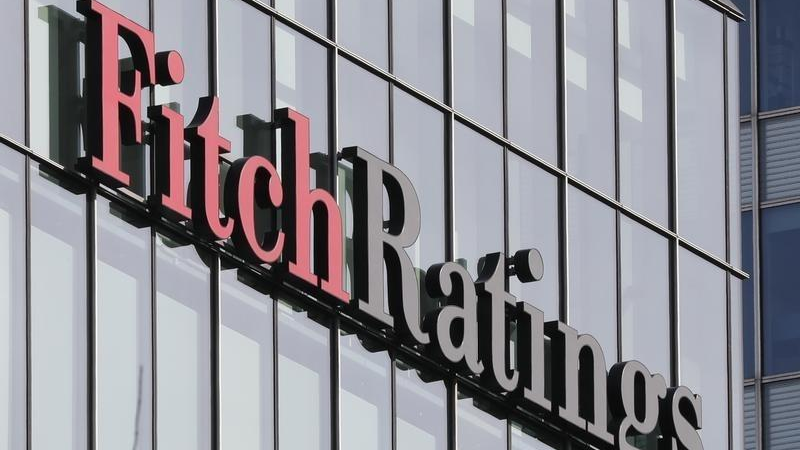Finance
Fitch Ratings Revises Nigeria’s Outlook to Positive, Affirms ‘B-‘ Rating
Published
2 years agoon

Fitch Ratings has revised the Outlook on Nigeria’s Long-Term Foreign-Currency Issuer Default Rating (IDR) to Positive from Stable, and affirmed the IDR at ‘B-‘.
Read Also:
In its latest rating released yesterday, which was obtained by BUSINES METRICS, the global agency pointed out that the positive outlook partly reflected reforms over the last year to support the restoration of macroeconomic stability and enhance policy coherence and credibility.
It noted that in Nigeria, Exchange rate and monetary policy frameworks have been adjusted, fuel subsidies reduced, coordination between the ministry of finance and the Central Bank of Nigeria (CBN) improved; Central Bank of Nigeria’s (CBN) financing of the government scaled back, with administrative efficiency measures being taken to raise the currently low government revenue, as well as oil production.
“The reforms have reduced distortions stemming from previous unconventional monetary and exchange rate policies, resulting in the return of sizeable inflows to the official foreign exchange (FX) market. Nevertheless, we see significant short-term challenges, notably, inflation is high and the FX market has yet to stabilise, and the durability of the commitment to reform is to be tested.
“The CBN has stepped up efforts to reform the monetary and exchange rate framework following last year’s unification of the multiple exchange rate windows, and the large differential between the official and parallel market rates has collapsed. Average daily FX turnover at the official FX window has risen sharply from 2H23, and there has been clearance of $4.5 billion of the backlog of unpaid FX forwards (the validity of the outstanding $2.2 billion is being assessed by CBN), and weekly sales of FC to bureaux de changes (BDCs) have resumed (having been suspended since 2021).
“Greater formalisation of FX activity and monetary policy tightening has contributed to a significant rise in foreign portfolio investment inflows, and a fast appreciation of the naira at the official FX window, following the 71 per cent post-liberalisation depreciation between June 2023 and mid-March 2024, although the exchange rate remains volatile. However, Fitch views continued lack of clarity in the size of net FX reserves as a constraint on the sovereign’s credit profile,” it stated.
Fitch Ratings anticipated further increases in the CBN monetary policy rate in the second half of 2024, following the 600bp hike to 24.75 per cent since February 2024, alongside tightening of reserve requirements and, “strengthening of monetary policy transmission, after the recent resumption of open market operations at rates closely aligned to the MPR.”
“We project inflation, which rose to 33.2 per cent year-on-year in March due partly to exchange rate pass-through and rising food prices, to average 26.3 per cent in 2024 and 18.2 per cent in 2025, still well above our projected ‘B’ median of 4.5 per cent.
“Fitch forecasts the budget deficit to widen 0.3 percentage point (pp) in 2024 to 4.5 per cent of GDP (but 0.5pp lower than we projected at our last review). This is due to improving non-oil revenue and partial fuel subsidy removal being offset by underperformance in oil profits from Nigerian National Petroleum Corporation Limited (despite a potential improvement in oil production) and higher payments for debt servicing, personnel and capex.
“We project a two pp rise in general government (GG) revenue/GDP from 2023 to 2025 to 9.6 per cent, helped by increased mobilisation of non-oil tax revenue, to narrow the budget deficit to 4.1 per cent in 2025. Nevertheless, the GG revenue/GDP ratio would remain one of the lowest of Fitch-rated sovereigns. The government has sharply reduced recourse to its CBN ‘Ways and Means’ overdraft this year, and banks’ healthy foreign currency (FC) liquidity and strong demand for government securities support domestic financing capacity.
“We expect oil refining capacity to increase in 2024-2025 as the Dangote plant ramps up, with an eventual 0.65 mbpd capacity. This will reduce transportation costs and lower refined oil imports, which should ease FX demand. We anticipate an increase in crude oil production (including condensates) in 2024-2025, averaging 1.75 mbpd, from 1.58 mbpd in 2023, helped by improved onshore surveillance, but this is still well below the 2019 level, reflecting underinvestment in the sector and production outages,” it added.
According to Fitch, “Nigeria’s rating is supported by its large economy, developed and liquid domestic debt market, and large oil and gas reserves. It is constrained by weak governance indicators relative to peers’, high hydrocarbon dependence, limited crude oil production capacity, weak net FX reserves, high inflation, ongoing security challenges, and structurally low, albeit improving, non-oil revenue.”
Share this:
- Click to share on X (Opens in new window) X
- Click to share on Facebook (Opens in new window) Facebook
- Click to share on WhatsApp (Opens in new window) WhatsApp
- Click to share on Pocket (Opens in new window) Pocket
- Click to share on Telegram (Opens in new window) Telegram
- Click to email a link to a friend (Opens in new window) Email
- Click to share on LinkedIn (Opens in new window) LinkedIn
You may like


Oil prices boom means subsidy doom for Nigeria – Fitch


Fitch affirms AfDB has stable outlook with triple-A


Fitch predicts $6.63 surge in Nigeria’s external reserves in 2021


REBOUND: Fitch projects improved global GDP at 5.3% in 2021


Fitch Ratings revises Coronation Merchant Bank’s outlook to stable


UBA’s financial outlook is stable, says Fitch Ratings






